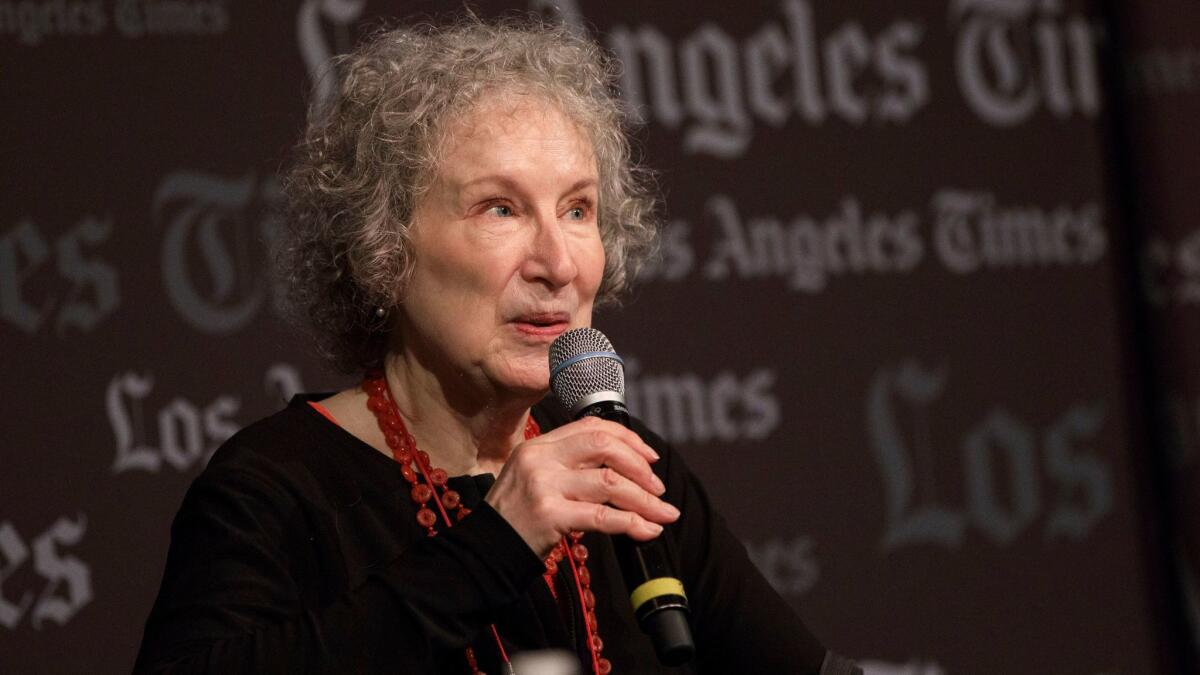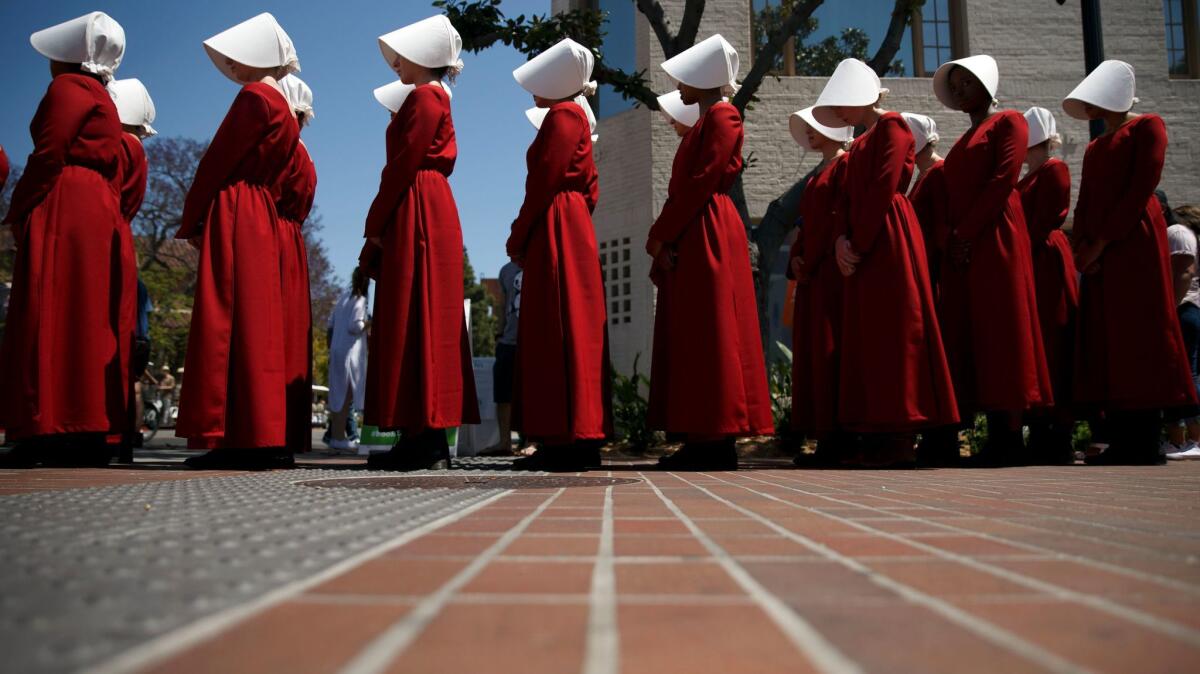Q&A: Margaret Atwood answers the question: Is ‘The Handmaid’s Tale’ a feminist book?

- Share via
Have you seen the handmaids?
I just saw the handmaids; they were in proper formation. They very modestly did not speak to us. But if you go up and ask them for a card, they will give you a card that says, “Don’t let the bastards grind you down” in Latin. And they will explain to you what it means in English. They’re doing their job.
The handmaids have been appearing all over the country. On top of being a splendid marketing tool for the show on Hulu, what is it like to see these creatures from your imagination, not just embodied, but such a central part of a larger political conversation right now?
It’s very weird. But we have to give some credit to the designer of the outfits, which are now very iconic. I’ve seen various iterations of this outfit over the years and she’s done a wonderful job. Her name is Ane Crabtree.
It is quite strange [the first images of the handmaids] came to me on Twitter. Someone took a video and sent it to me, I wasn’t expecting that. The [handmaids] who turned up at the Texas Legislature were not from Hulu. They popped up in the form of signs during the huge [women’s] march in January.

This book was written in 1985, but it’s seen as so prescient. How does it feel to have written something that seems like it’s coming true?
Oh course, you write such things in the hopes that they will therefore not come true. On the plus side, a lot of the people are reading the book. On the negative side, for reasons that you would not necessarily wish. It’s ambivalent.
I think that the television series has given a huge boost to that as well. Putting the trailer ad right in the middle of the Super Bowl, another unexpected move. I would call that guerrilla marketing.
There was a little kerfuffle at the Tribeca Film Festival about whether it’s a feminist reading. And you call it an alternative future. It’s not sci-fi?
It’s not sci-fi in a galaxy far, far away and in another time. It’s SF on this planet here, now, shortly. More like “1984” and less like “Star Wars.”
Do you consider it a feminist book?
If you DJ reality, that is, if you make a mash-up of actual reality, which is partly what that book is, you’re going to end up with something that inevitably people will say, “This is feminist.” Because you cannot avoid that.
Just as if you do a mash-up of reality from the point of view of African Americans in this country, you’re going to end up with something that will say, “This is Black Lives Matter.” It’s not that people necessarily have started out from that premise. But if you’re looking at reality, that will be the result because that is reality.
I didn’t put anything into the book that has not happened sometime, somewhere. Or wasn’t happening then and isn’t happening now. So you can call that feminist, if you like. I didn’t start from ideology, I started from what I was collecting and seeing. But of course, I must have been instigated, must I not?
That’s No. 1, No. 2. I always want to know what people mean by that word. Some people mean it quite negatively, other people mean it very positively, some people mean it in a broad sense, other people mean it in a more specific sense. Therefore, in order to answer the question, you have to ask the person what they mean.
You’re an early adapter of Twitter and digital technology. Do you think this is something that helps people organize? Something that would help prevent the circumstances of “Handmaid’s Tale”?
In early stages, it would help people organize, as it has done. But unfortunately, it also helps dictatorial regimes identify where you are and who you are. There’s a sketch on the Onion, some years ago that said, “The CIA has just invented this wonderful new thing to identify everybody in the country and it’s called Facebook.” That was a joke, but…
In a democracy, when you’re still allowed to have protest marches without being shot and arrested, I think, yes, it’s a very good drawing-together and news-disseminating tool. But as you can see, it can also be used to disseminate news for purposes that you might not necessarily endorse. It’s a tool, but who is using that tool, and what are they using it for?
In this regime, in Gilead No. 1, those women do not have cellphones. And No. 2, if they did, they would probably take out the SIM cards and grind them to powder because they don’t want people knowing where they are.
You participated in the women’s march. Did you see the science march?
The science thing is very, very worrying. I didn’t participate in it because I was on a plane. But I know a lot of scientists, I grew up with scientists and I disseminated the news of the science march on my Twitter. The science thing is extremely worrying. We lived a version of that in Canada. We had the same kinds of things being defunded under the previous regime. Part of the intent was to get get rid of any data with climate change and environmental pollution. License to pollute your drinking water and have your kids drink that, and you’re not allowed to know what’s in it.
Is there anything you want to say to your readers?
Keep the faith. Whatever that may be. Don’t get too depressed yet, because I have a belief in America being very diverse and ornery, and containing a lot of people who are not going to roll over very easily for a totalitarian dictatorship. That is what I think.
It has been a bit of a shock to the very young, who don’t remember things like this in the past. They think this is the very, very worst thing that has ever happened. But trust me, it isn’t. Your mission is to keep this from not being any worse than it is.
“The Handmaid’s Tale” premieres on Hulu on April 26.
The biggest entertainment stories
Get our big stories about Hollywood, film, television, music, arts, culture and more right in your inbox as soon as they publish.
You may occasionally receive promotional content from the Los Angeles Times.







